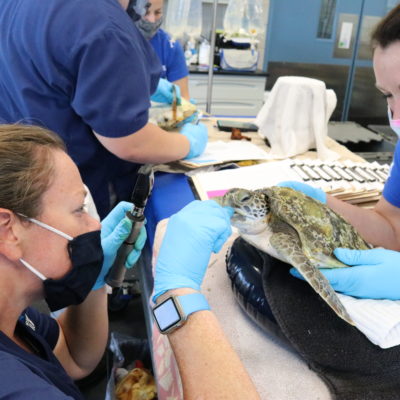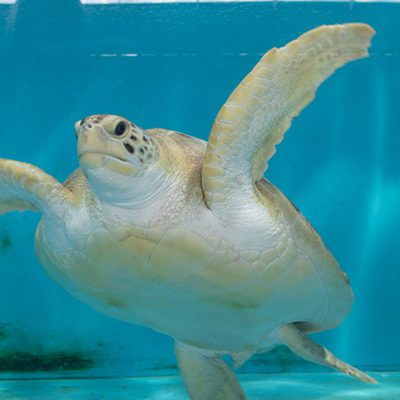Press Room
Tampa, FL (April 27, 2022): Traveling 136 miles over six days might not seem like much; but, for The Florida Aquarium’s Animal Response Team this ‘slow’ and steady progress is worth celebrating – and documenting. Recently a juvenile loggerhead sea turtle, referred to at the time of release as Palmer, made its triumphant return to the open ocean following rehabilitation at The Florida Aquarium’s Sea Turtle Rehabilitation Center.
Palmer stranded in Cape Cod, Massachusetts as a result of a cold-stun event. Initially triaged at the New England Aquarium, Palmer was flown – along with three other rescued loggerheads – in a private airplane to Tampa by volunteers from the non-profit organization, Turtles Fly Too.
Cold-stunning occurs when cold-blooded animals, like sea turtles, are exposed to unusually cold water and air temperatures for an extended period of time; causing a hypothermic reaction that may include a lower heart rate, decreased circulation, lethargy, pneumonia, secondary bacterial infections and if left untreated, death.
“Exposure to cold air and water temperatures over a prolonged period of time ultimately debilitated this young loggerhead. As result he developed secondary medical conditions that required treatment,” said Ashley Riese, Manager of The Florida Aquarium’s Sea Turtle Rehabilitation Center.
Arriving at the Sea Turtle Rehabilitation Center in early January, Palmer received a regimen of antibiotics and supportive care by the professionals at The Florida Aquarium until his release back to the open ocean on April 21.
Equipped with a satellite tag, scientists will acquire important data from Palmer including diving, feeding, migratory and other activity patterns along with corresponding environmental conditions like water temperatures, etc. These data points will help to provide key insight for future conservation efforts.
“Thanks to our partners from the Sea Turtle Conservancy and Association of Zoos and Aquariums (AZA) Conservation Grants Fund (CGF), who funded the satellite tag for Palmer, we can share this incredible journey with the turtle loving public,” added Riese.
A map showing Palmer’s migratory movements as tracked by satellite can be found by visiting The Florida Aquarium’s website at https://www.flaquarium.org/conservation/sea-turtle-conservation-program/sea-turtle-tracking/.
“We are hoping that as the public watches Palmer’s travels they will develop a stronger connection to not only him but all sea turtles,” added Riese. “It’s when we begin building this affinity with nature that we make better choices to protect and restore the ocean.”
Palmer’s second chance was made possible by The Florida Aquarium, New England Aquarium, Turtles Fly Too, Florida Fish and Wildlife Conservation Commission (FWC) and The National Oceanic and Atmospheric Administration (NOAA).
All sea turtle rehabilitation work conducted by The Florida Aquarium is done with the approval of (FWC) under conditions not harmful to marine turtles and authorized under conservation activities pursuant to FWC MTP-22-179.
Contact The Florida Aquarium communications@flaquarium.org
More
to Sea

Florida Aquarium Rallies for Endangered Sea T...
It was a record-setting event for The Florida Aquarium when the team of animal care professionals admitted 17 sea turtles to the Sea Turtle Rehabilitation Center at the Center for Conservation campus ...
Read More
Threatened Green Sea Turtle Makes New Home at...
In 2016, The Florida Aquarium’s animal care team took in Banner, a threatened green sea turtle. After four years of rehabilitation and care, Banner has successfully made the 600-mile trek up the Gul...
Read More